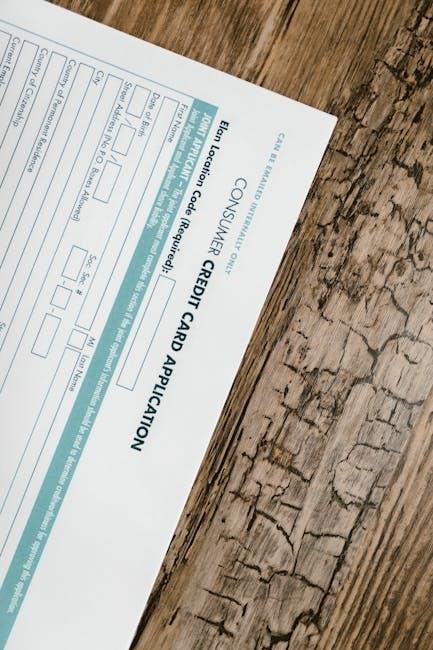A Credit Union Loan Application Form is a document used by members to request loans‚ offering options like personal‚ auto‚ and home equity loans. Membership is typically required‚ and the form streamlines the loan process by gathering essential personal and financial details. Applicants must provide income verification‚ employment information‚ and meet specific eligibility criteria. The form ensures a structured approach to loan requests‚ facilitating efficient processing and approval. Using a credit union often provides competitive rates and tailored financial solutions for members.
Overview of Credit Union Loan Application Process
The credit union loan application process begins with submitting a completed loan application form‚ either online or in-person‚ along with required documents such as proof of income‚ identification‚ and financial statements. Applicants must meet membership criteria and creditworthiness standards. Once submitted‚ the credit union reviews the application‚ verifying details and assessing eligibility. Approval or denial is typically communicated within a few business days‚ with funds disbursed upon approval. The process emphasizes streamlined steps‚ ensuring efficiency and transparency for members seeking financial assistance through various loan options.
Benefits of Using a Credit Union Loan Application Form
Using a credit union loan application form offers numerous benefits‚ including competitive interest rates‚ lower fees‚ and personalized financial solutions. Members gain access to streamlined processes‚ ensuring efficient loan approval and disbursement. The form simplifies gathering necessary details‚ reducing paperwork and saving time. Credit unions often provide tailored loan options‚ catering to individual needs such as auto‚ home equity‚ or personal loans. Additionally‚ membership requirements ensure a sense of community and shared financial goals. The structured format of the application form ensures transparency‚ making it easier for applicants to understand and meet the necessary criteria for loan approval.
Structure of a Credit Union Loan Application Form
A credit union loan application form typically includes sections for personal details‚ financial information‚ employment history‚ loan-specific requirements‚ and asset disclosure‚ ensuring a comprehensive review process.
Personal Details Section
The Personal Details Section of a credit union loan application form requires basic information about the applicant‚ including their full name‚ date of birth‚ and contact details such as phone number and email. Applicants must also provide their residential address‚ including postal code‚ and specify their marital status. Additionally‚ some forms may ask for a member number or citizenship status. This section helps verify the applicant’s identity and ensures they meet the credit union’s membership criteria. Accurate and complete information is crucial for processing the loan application efficiently and determining eligibility for approval.
Financial Information and Employment Details
The Financial Information and Employment Details section requires applicants to provide their income sources‚ employment status‚ and duration of employment. It also asks for monthly expenses‚ total assets‚ liabilities‚ and existing debts. This section helps assess the applicant’s creditworthiness and ability to repay the loan. Applicants must disclose their net worth and provide evidence of income‚ such as recent payslips or bank statements. This information ensures the credit union can evaluate the applicant’s financial stability and make an informed decision regarding loan approval and terms. Accurate disclosure is essential for a smooth and successful application process.
Loan-Specific Requirements and Preferences
The Loan-Specific Requirements and Preferences section allows applicants to detail their loan needs‚ such as the type of loan (e.g.‚ personal‚ auto‚ or home equity) and the desired amount. Applicants must specify the loan purpose‚ repayment terms‚ and preferred interest rate options. This section may also include questions about collateral‚ if required‚ and any additional loan features‚ such as insurance or flexible repayment plans. Providing clear and accurate information in this section helps the credit union tailor the loan to the applicant’s needs and ensure a smooth approval process. This step is crucial for aligning the loan terms with the applicant’s financial goals and preferences.

Eligibility Criteria for Credit Union Loan Applications
Membership in the credit union is typically mandatory. Applicants must meet specific financial and creditworthiness standards‚ including stable income‚ acceptable credit history‚ and reasonable debt-to-income ratios.
Membership Requirements for Credit Union Loans
Membership in a credit union is a prerequisite for applying for a loan. To join‚ individuals must meet specific eligibility criteria‚ such as working for a qualifying employer‚ living in a designated area‚ or belonging to a specific organization. Some credit unions also allow membership by joining affiliated groups or paying a small fee. Once members‚ they can access loan services. Membership requirements vary by credit union but often include opening a share account with a minimum deposit. This ensures members have a financial stake in the cooperative‚ aligning with the credit union’s community-focused mission.
Creditworthiness and Income Verification

Creditworthiness and income verification are critical components of a credit union loan application. Applicants must demonstrate financial stability and the ability to repay the loan. This involves providing proof of steady income‚ such as pay stubs or tax returns‚ and disclosing employment details. Credit unions also evaluate credit history to assess risk‚ with favorable scores often leading to better loan terms. Additionally‚ the debt-to-income ratio is considered to ensure borrowers can manage their obligations. These checks help credit unions make informed lending decisions while protecting both parties from potential financial risks. Accurate documentation is essential for a smooth approval process.

Required Documents for Loan Application
Required documents include identification‚ proof of income‚ bank statements‚ and employment verification. Additional disclosures of assets and liabilities may be necessary for accurate loan assessment.
Identification and Proof of Income
Applicants must provide valid government-issued identification‚ such as a passport or driver’s license‚ to verify their identity. Proof of income is essential‚ typically including recent pay stubs‚ W-2 forms‚ or bank statements. For self-employed individuals‚ tax returns or financial statements may be required. Additional documentation‚ like Social Security cards or visas‚ might be needed depending on the credit union’s policies. Accurate and up-to-date information ensures the loan application is processed efficiently. Failure to provide these documents may delay approval or result in rejection. The credit union uses this information to assess creditworthiness and determine loan eligibility.
Asset and Liability Disclosure
The Asset and Liability Disclosure section requires applicants to list all financial assets and liabilities. Assets may include savings accounts‚ investments‚ property‚ and retirement funds‚ while liabilities encompass debts like loans‚ credit cards‚ and mortgages. This disclosure helps the credit union evaluate the applicant’s financial stability and risk level. Accurate reporting is critical‚ as misrepresentation can lead to application rejection or future complications. By providing a clear picture of their financial situation‚ applicants demonstrate transparency and responsibility‚ which are key factors in loan approval. This step ensures the credit union can make an informed decision based on the member’s overall financial health.

Steps to Complete the Loan Application Process
Visit the credit union’s website‚ review guidelines‚ and complete the form accurately; Gather required documents‚ submit online or in-person‚ and follow instructions carefully to avoid delays.

Online Application Submission
Access the credit union’s website and navigate to the loan application section. Review the guidelines and complete the form accurately‚ ensuring all required fields are filled. Upload necessary documents‚ such as proof of income and identification‚ through the secure portal. Submit the application and receive a confirmation message. Some credit unions offer 24-hour processing‚ with approvals sent via email or phone. Keep a copy of the submission for your records. Online applications are convenient‚ efficient‚ and typically processed quickly‚ making it an ideal option for members seeking fast loan approvals.
In-Person Application Process
Visit your local credit union branch to complete the loan application in person. Bring all required documents‚ such as identification‚ proof of income‚ and employment verification. Meet with a credit union representative who will guide you through the application process‚ answer questions‚ and ensure all sections are filled out correctly. Once the form is completed‚ submit it directly to the representative. This method allows for immediate assistance and clarification of any concerns. In-person applications are ideal for those who prefer face-to-face interaction or need help navigating the process. The representative will review your application and provide updates on the next steps.

Post-Submission Process and Follow-Up
After submitting your loan application‚ the credit union will review and verify the details. Once approved‚ funds are disbursed‚ and you’ll receive confirmation. Follow up with the credit union for any additional instructions or updates on your loan status.
Processing Time and Approval Criteria
The processing time for credit union loan applications typically ranges from 24 hours to several business days‚ depending on the complexity and completeness of the submission. Approval criteria include a review of creditworthiness‚ income verification‚ debt-to-income ratio‚ and employment stability. The credit union may also assess collateral value for secured loans. Once approved‚ the loan agreement outlining terms‚ interest rates‚ and repayment schedules is provided. Some credit unions offer rapid approvals‚ especially for existing members‚ with funds disbursed shortly after acceptance. Ensure all required documents are submitted to expedite the process and improve approval chances.
Receiving Loan Funds and Next Steps
Once approved‚ loan funds are typically disbursed within a few business days. Members receive funds via direct deposit‚ check‚ or internal transfer to their credit union account. Upon disbursement‚ the borrower must review and sign the loan agreement‚ ensuring all terms and repayment schedules are understood. The first payment is usually due within 30 to 45 days. Borrowers can set up autopay‚ online payments‚ or in-person payments for convenience. Timely payments are crucial to avoid late fees and maintain a positive credit history. Understanding the repayment schedule and terms ensures smooth management of the loan obligation.